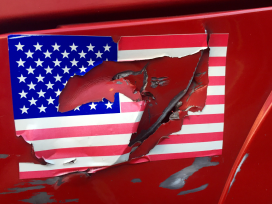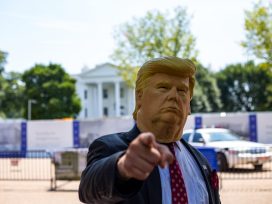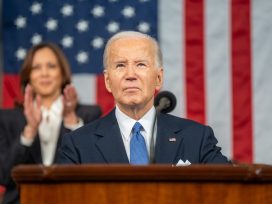As an audience draw for TV, it ranks far behind the Olympic Games, to say nothing of the four-times-weekly “Who Wants to Be a Millionaire?” The odd thing is that you can’t really blame the candidates. Whatever his faults, George W. is an entertaining fellow, and in a less self-conscious era he might have been relied on to tell good jokes and step on interesting toes. Al Gore, the eternal Good Son, might have raised Sincerity to the eloquence of Woodrow Wilson and Adlai Stevenson, two politicians still remembered for their integrity if not their political savvy.
But no matter how many Latino rap concerts or Mississippi riverboat trips campaign managers dream up this election season, crowds are small and discussions nonexistent. Because writers have nothing to write about, possible explanations for the ennui fill the pages of journals and newspapers. Some say that the candidates represent such traditional Democratic and Republican values (big government vs. small, etc.) that neither offers anything new; others say that the only difference between them is their managerial styles. Some say that the campaigns have been too carefully orchestrated for the media; others write that TV and the other media are only interested in paid political ads, which will top $600 million this year. Almost everyone says that the country is so prosperous that no one cares.
But no one really knows. Which is strange, since in American politics everyone always knows, even if what one knows changes from day to day.
Not knowing may in fact be the core of the problem. Beneath the endless talk of prosperity, what we may be seeing is a stage in the American republic where it’s faced with unanswerable questions, unsolvable problems – unsolvable without radically altering the Constitution and Bill of Rights, something that’s virtually impossible to do.
Take health care and education, two relatively hot areas of debate in this tepid campaign. Until now, both issues have been treated lightly, in the former case because the medical and insurance lobbies have resisted socialization, in the latter because the lion’s share of the education budget comes from the states, not the federal government. Yet both areas are deeply troubled. Something like 40 million Americans have no health insurance of any kind, and increased life expectancy means that the post-war baby boomer generation will soon put great demands on Medicare. Not even the most optimistic observer would disagree that education isn’t working on a number of levels– from early childhood preparation to high drop-out rates in high school to brutal competition for places in prestigious universities. Yet nothing that either candidate has proposed is more than a band-aid over increasingly gaping wounds.
Why haven’t the candidates taken bolder stands? Most likely the roots lie in the twin (and largely incompatible) principles of individual freedom and equal opportunity, the very underpinnings of the American state. Tocqueville saw the conflict right away, and since then political philosophers from Marx to Charles Taylor have tried to reconcile them. But in practical areas like health care and education the tension between “liberty” and “equality” is obvious. How do you create a health care system that provides for everybody yet preserves the right of individual choice of doctors and courses of treatment (an issue even more familiar, I suspect, to Europeans than to Americans)? In a country of profound gaps in social background and economic status, can one create an educational system that compensates for inequities while allowing everyone to work to his full capacity? Given the size of the country and the power of special interest groups, these problems may actually be insoluble.
But there’s an even deeper reason for election ennui. As well as facing difficult practical problems, we’re also confronting the moral implications of limited democratic government. Prosperity hasn’t brought happiness. Most people– including the candidates– are aware, however dimly, of a malaise in the country whose symptoms include an ever-increasing gap between rich and poor, and an atmosphere of ruthlessness and incivility. No one knows how to use the apparatus of government against these ills, or if it can be used at all. Due to the diminished influence of civic institutions like clubs, unions, churches, neighborhoods to mitigate against the tendency toward total self-involvement, the country feels like a harder place to live in, despite all the TV’s and computers that clutter our overpriced homes.
Who or what is to blame? Obviously capitalism as the sole metaphor for our behavior is one of the culprits. Full employment or not, jobs are much more unstable, people work harder and feel less secure. But there are other culprits – an “information” overload that exhausts rather than fulfills; diminishing of physical space that makes us touchy and unkind to each other; repetitive, mindless entertainment that parodies the old Soviet concept of mass culture; and social mores that promise endless choice but leave us feeling empty. Since western-style democracy can’t really address these and similar issues, we’re left with little or no hope – and hope may be the very cornerstone of democracy, hope and belief in its own perfectibility. Without hope, candidates may seem even more boring than they are.
Will faith in federal government ever be restored? ( There’ll always be interest in local government as long as it controls the cops, firemen and schools.) In the not-too-distant future, if only to liven things up, we can probably expect an African-American candidate for President or Vice-President; whatever his or her talents, he’ll provide novelty to a bored electorate. But in the long run it may take nothing short of a disaster– a major economic downturn like the 1930’s – for Americans to re-identify with government, and to see that at its best it is us caring for each other.






